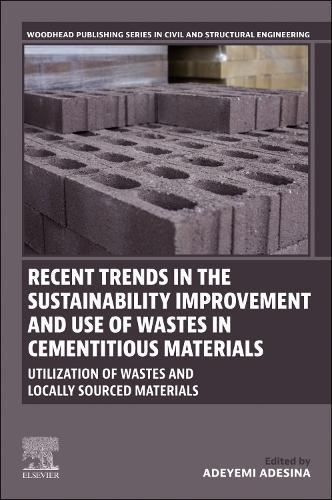Overview
Recent Trends in the Sustainability Improvement and Use of Wastes in Cementitious Materials: Utilization of Wastes and Locally Sourced Materials delves into modern advancements aimed at enhancing the sustainability of cementitious materials. With increasing awareness in the construction sector about the environmental repercussions of traditional cement, particularly Portland cement, the book explores various sustainable alternatives. By presenting theoretical foundations and practical applications, it outlines how waste products and local materials can be integrated into cementitious materials to mitigate environmental impact. The book is divided into seven key sections: partial and total replacement of Portland cement as a binder, use of waste products as aggregate and reinforcement, life cycle assessment, numerical analysis, and case studies. It provides a comprehensive reference for academic researchers, materials scientists, engineers, R&D managers, and practitioners focusing on environmental sustainability in construction.
Full Product Details
Author: Adeyemi Adesina (Research Associate, University of Windsor, Canada)
Publisher: Elsevier - Health Sciences Division
Imprint: Woodhead Publishing
ISBN: 9780443156700
ISBN 10: 0443156700
Pages: 900
Publication Date: 01 December 2025
Audience:
Professional and scholarly
,
Professional & Vocational
Format: Paperback
Publisher's Status: Forthcoming
Availability: Not yet available

This item is yet to be released. You can pre-order this item and we will dispatch it to you upon its release.
Author Information
Adeyemi Adesina is a research associate at the University of Windsor and a Sustainability Consultant where his research revolves around the sustainability and performance improvement of various cementitious materials. He received his BEng from the University of Iloran, Nigeria in 2012 and then went on to receive his Master’s in 2016 from Concordia University in Montreal. In April 2022 he was awarded his PhD in Civil and Environmental Engineering from the University of Windsor in Ontario. His extensive research has resulted in various practical applications which have helped various construction companies to improve the sustainability and performance of their construction materials. Dr. Adesina has active collaborators in more than 12 countries on different continents which has resulted in carrying out research that has both local and global impacts. Dr. Adesina has also published more than 100 technical papers in various top journals including chapters in books published by Elsevier and Springer. Dr. Adesina is also a technical committee member of ACI committee 301 on Concrete Sustainability and RILEM TC 294 on Mechanical Properties of Alkali-activated Concrete.



